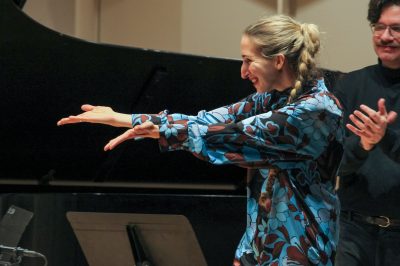Staccato piano strikes, rapid violin strokes and resounding clarinet notes answer each others’ calls in a whirlwind of sound that reverberated through the Boston University College of Fine Arts’ Concert Hall.
Sarah Nemtsov’s piece titled “Keter” was one of two compositions from her catalog performed during the CFA’s concert on Jan. 31.

Nemtsov, an applauded German composer, was selected to be the CFA’s composer in residence this semester. From Jan. 23 to Feb. 1, she spoke on panels about her work and met with students for individual lessons to advise their practice and provide a different perspective.
“I was nervous like, ‘could I tell them anything?’ but it’s also good to see that even if we aesthetically composed completely different music, we have topics to talk about,” Nemtsov said.
Before becoming a composer, Nemtsov had a background as a musician, which she said aided her perspective as a composer and lecturer.
“It’s very helpful to know how it feels, what difficulties are also in chamber music,” Nemtsov said. “Having the real, actual sounds around you helps the imagination.”
Nemtsov was an active oboist for most of her childhood and into her young adult life, but she stopped playing in 2007 to pursue composing.
“I miss it, but I just love musicians so much. I feel like I fill the gap a little bit by working with musicians,” Nemtsov said.
Spanning multiple different genres of music, Nemtsov said her work has moved more in an electronic direction in recent years, a shift due to her appreciation of electronic music’s role in the modern world.
“I like to combine it with the classical instruments in a way where it’s not always clear who’s what, or what is what, and creating something hybrid, in between, something that is ambiguous,” Nemtsov said.
Both pieces performed during the concert involved utilizing this hybrid style, which Julia Crosson, composer and senior in the CFA’s College of Music, found to be inspiring. She said the selection made her want to explore electronics in music.
Crosson said that she got to perform directly for Nemtsov, showing her two different versions of a piano étude that Crosson was working on with her composition professor.
“I really enjoyed studying with her,” Crosson said. “I thought she had some good insights.”
Nemtsov said she’s “happy to share” her experience with students.
“I feel now it’s time to give something to the younger generation,” Nemtsov said. “It also feeds my own composition … and I didn’t expect that to happen, but I feel that I’m learning a lot while teaching.”
Her openness contributed to why she was a great fit for the composer in residence program, said Joshua Fineberg, a music professor and the director of BU’s Center for New Music.
“She models a really dynamic, engaged life as a composer in the world today,” Fineberg said.
Nemtsov said she encourages introspection in students through the music they play.
“I’m happy if some of my students reveal their own voice, and are courageous to take a risk and put it out there into the world,” Nemtsov said.
Nemtsov’s experience as a woman in composition provides a unique perspective to her teaching. A Science Direct analysis of composers from the entire history of Western classical music found that only 6% of the 17,000 composers in the database were women.
As a teenager entering in composition courses or workshops, Nemtsov was often the only female composer present in the room. Nemtsov said having role models in the industry was important in pursuing the profession.
“I can say as a female composer myself, there is sometimes a lack of confidence for applying in competitions,” Nemtsov said. “Very often there are still many more male applications, white male applications for workshops, competitions.”
While acknowledging that the music industry is moving in a better direction, Nemtsov said “there is still a lot to do.”
She said that younger musicians tend to be “really open-minded” and “very diverse” and that her experience during her residence has already given her more hope that things are changing for the better.
“It’s good to see that sometimes in this gloomy, dark world, to see young people and see there’s maybe some hope,” Nemtsov said.






















































































































